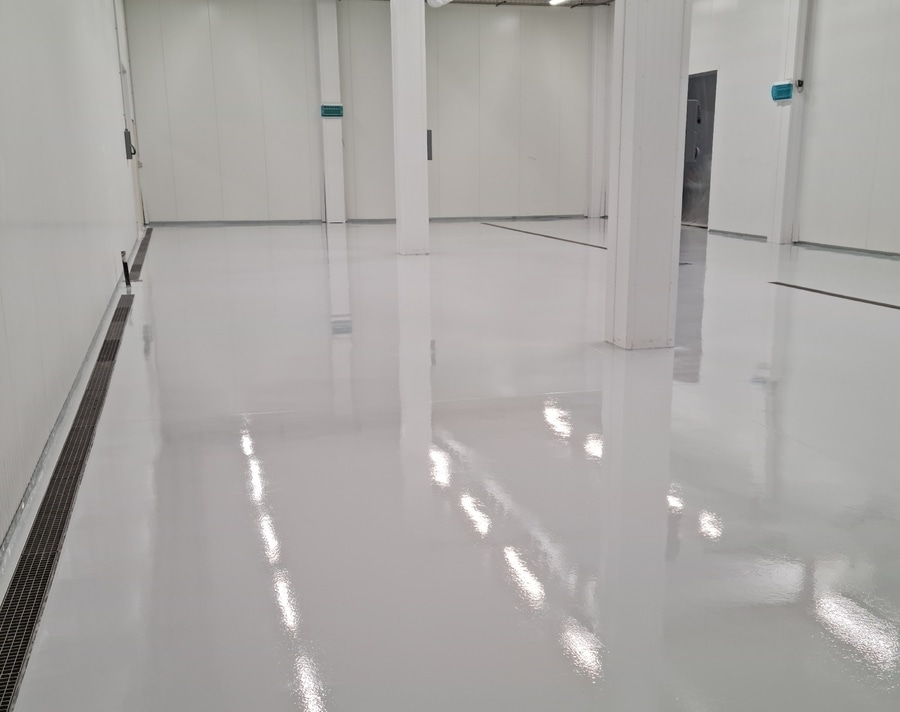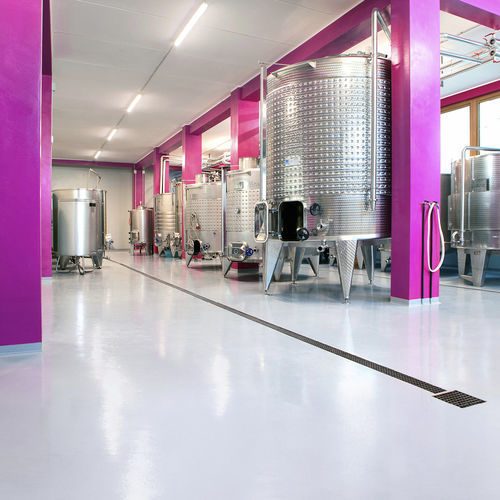
#Inspiration
Resin floors for cold storages
Resin floors are well-suited for cold storage warehouses and temperature-controlled distribution centres, where specific flooring requirements are essential to ensure safe and efficient operations.
Resin floors are well-suited for refrigerated logistics environments, such as cold storage warehouses and temperature-controlled distribution centres, where specific flooring requirements are essential to ensure safe and efficient operations.
Cold storage facilities mainly refer to large, refrigerated rooms or structures that are used to house anything from perishable groceries to biopharmaceuticals at very low or below freezing temperatures. Often, these facilities are also known as refrigerated warehousing.
Cold storage is necessary for industries dealing with goods that are perishable and biodegradable when subjected to normal room temperatures. Therefore, refrigeration helps to inhibit the chemical changes of fresh produce, and preserves its integrity, quality, and shelf-life. Cold storage facilities are commonly used in grocery stores, dairies, industrial kitchens of restaurants and hotels, research labs, and hospitals.
the basic requirements of most cold storage facilities:
8. Able to withstand cold or freezing temperatures.
9. Tolerant of heavy loads and equipment
10. Protects against acids and chemicals.
11. Hygienic
12. Easy to clean.
13. Slip-resistant
14. Abrasion-resistant
When it comes to health and safety in the food and beverage industry, there’s no room for error or complacency.
Unsafe food can have far-reaching ramifications for public health and can also negatively impact the offending organisation’s bottom line in terms of financial penalties, costly downtime, and reputational damage. Strict standards are necessary and food processing plants are under constant scrutiny to ensure regulatory compliance from the ground up — starting with the floor.
Epoxy floors can provide the ultimate in food-safe flooring. They meet HACCP requirements and deliver outstanding levels of durability, hygiene, safety, and longevity. Their seamless, impermeable surface provides a protective barrier against all types of contaminants and can be cleaned easily to ensure the highest standards of hygiene and food safety.
Here's how resin floors meet the needs of these conditions:
1. Anti-slip properties: In refrigerated logistics environments, floors can become wet and slippery due to condensation and frost formation. Resin floors can be engineered with anti-slip properties, providing better traction for workers and equipment, reducing the risk of slip and fall accidents in these cold and potentially hazardous conditions.
2. Resistance to low temperatures: Resin floors are designed to withstand low temperatures without becoming brittle or cracking. They remain stable and maintain their performance even in sub-zero temperatures, making them ideal for use in refrigerated logistics environments where temperatures are often kept well below freezing.
3. Seamless and non-porous surface: Resin floors are applied as seamless surfaces, leaving no joints or crevices for moisture or contaminants to penetrate. The non-porous nature of these floors prevents water, oils, and other substances from seeping into the floor, facilitating easier and more effective cleaning.
4. Durability and impact resistance: Resin floors are highly durable and resistant to impact, making them capable of withstanding heavy foot traffic, the movement of forklifts, and other equipment used in refrigerated logistics operations.
5. Easy maintenance and cleaning: The smooth and non-porous surface of resin floors allows for easy cleaning and maintenance. Regular cleaning with standard cleaning agents ensures that any spills, debris, or residues are removed efficiently, contributing to a hygienic and safe working environment.
6. Chemical resistance: Some refrigerated logistics environments may use specific cleaning agents or chemicals to maintain cleanliness and control bacterial growth. Resin floors can be formulated with chemical-resistant properties, ensuring they are not adversely affected by the cleaning agents used in these cold storage facilities.
7. Fast installation and curing times: In busy refrigerated logistics environments, minimizing downtime is crucial. Resin floors offer fast installation and curing times, allowing the facility to resume regular operations quickly after the floor is installed or renovated.
8. Low-temperature installation: Some resin flooring systems are specially designed for low-temperature installation, eliminating the need for excessive heating during the installation process and providing a cost-effective solution for refrigerated environments.
By offering anti-slip properties, resistance to low temperatures, easy cleaning, and durability, resin floors contribute significantly to creating a safe and efficient working environment in refrigerated logistics settings. These floors withstand the unique challenges posed by cold storage facilities, ensuring the safety of workers, and maintaining the integrity of the facility's flooring in the demanding conditions of low temperatures and moisture.





